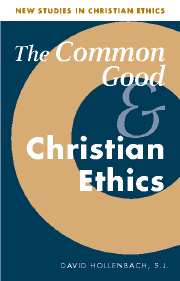4 - Religion in public
Published online by Cambridge University Press: 05 June 2012
Summary
The common good was displaced from its preeminent position in the public philosophy of the West by the emergence of serious religious disagreement about the meaning of the good life at the dawn of modernity. Because of this history, recovering the common good as a plausible social aim today requires careful consideration of the role of religious communities in public life. Today in both Europe and the United States religious pluralism is significantly greater than in the past, due to immigration, conversions to non-Western religions, the emergence of new religious movements, and the rise of agnosticism and unbelief. Widespread popular awareness of these religious differences is also higher today than in most of past history. International communication and travel have made Westerners newly conscious of the importance of non-Western religions in the lives of many of the peoples of the world. Because of this heightened awareness of religious diversity, there is considerable apprehension today about the dangers of religious involvement in politics in both popular and more theoretical discussions. These anxieties are based in real events, such as the divisive role played by religion in the conflicts of the Middle East, northern India, the former Yugoslavia, Northern Ireland, and numerous other places. Worries about the conflict-prone tendencies of religion are not the result of secularist paranoia. Religious beliefs and loyalties have a marked proclivity to deepen social divisions. They create communal bonds that do not coincide with those linking the citizens of nation-states.
- Type
- Chapter
- Information
- The Common Good and Christian Ethics , pp. 87 - 112Publisher: Cambridge University PressPrint publication year: 2002

